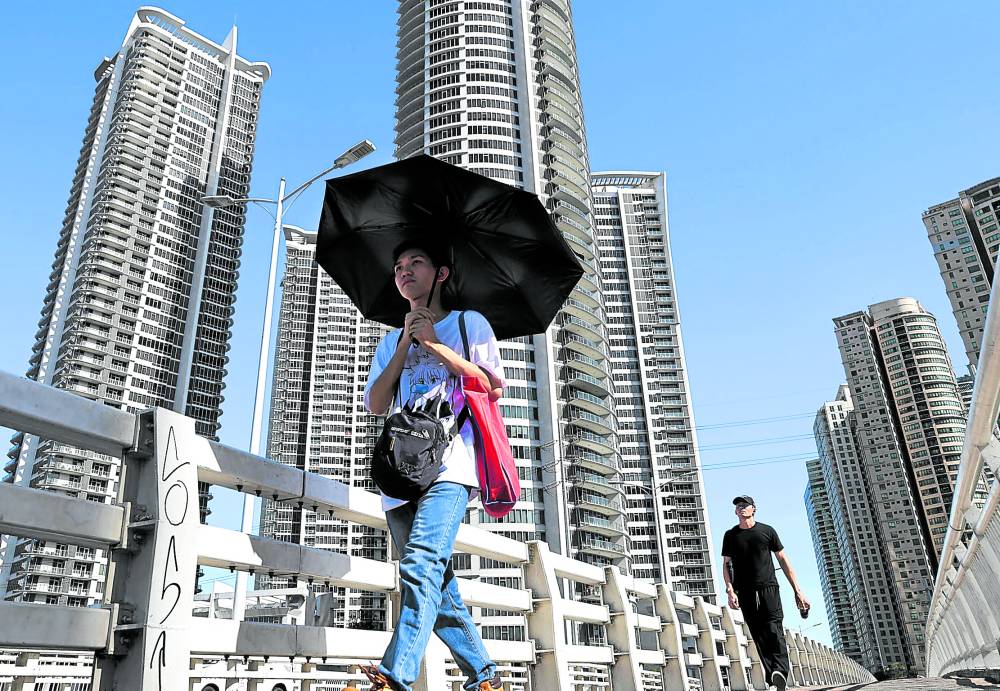
HEAT BUSTER A woman crosses the Estrella-Pantaleon bridge in Makati City with an umbrella to protect her from the hot midday sun. On Thursday, dangerous” heat index levels could hit over 39 areas in the country.—MARIANNE BERMUDEZ
MANILA, Philippines — “Dangerous” levels of heat indexes are forecast over 39 areas across the country on Thursday, said the Philippine Atmospheric, Geophysical, and Astronomical Services Administration (Pagasa).
Pagasa defines the heat index as “a measure of the contribution that high humidity makes to abnormally high temperatures in reducing the body’s ability to cool itself.”
READ: Red Cross reminds public to stay hydrated amid high heat index
Once it breaches 42ºC and up to 51ºC, Pagasa automatically considers it part of the “danger category,” increasing the risk for heat cramps, heat exhaustion, and heat stroke.
According to Pagasa, in its latest computed heat index forecast, the Central Bicol State University of Agriculture (CBSUA) Pili area in Camarines Sur is expected to reach the highest peak heat index at 48 ºC (degrees Celsius).
Meanwhile, in Metro Manila, the heat index around Ninoy Aquino International Airport (Naia), Pasay City, is forecast to peak at 43ºC, while 42ºC is expected in Science Garden, Quezon City.
On the other hand, Baguio City and La Trinidad in Benguet continue to have the lowest forecast peak heat index at only 28ºC.
Below is the list of areas forecast to register a heat index of or above 42ºC in descending order:
- CBSUA-Pili, Camarines Sur – 48ºC
- Dagupan City, Pangasinan – 47ºC
- Tacloban City, Leyte – 46ºC
- Laoag City, Ilocos Norte – 45ºC
- Bacnotan, La Union – 44ºC
- Tuguegarao City, Cagayan – 44ºC
- Cubi Pt., Subic Bay Olongapo City – 44ºC
- Puerto Princesa City, Palawan – 44ºC
- Aborlan, Palawan – 44ºC
- Roxas City, Capiz – 44ºC
- Iloilo City, Iloilo – 44ºC
- Dumangas, Iloilo – 44ºC
- Catarman, Northern Samar – 44ºC
- Naia Pasay City, Metro Manila – 43ºC
- Aparri, Cagayan – 43ºC
- Iba, Zambales – 43ºC
- Casiguran, Aurora – 43ºC
- Coron, Palawan – 43ºC
- San Jose, Occidental Mindoro – 43ºC
- Legazpi City, Albay – 43ºC
- Virac (Synop), Catanduanes – 43ºC
- La Granja, La Carlota, Negros Occidental – 43ºC
- Science Garden Quezon City, Metro Manila – 42ºC
- Sinait, Ilocos Sur – 42ºC
- MMSU, Batac, Ilocos Norte – 42ºC
- ISU Echague, Isabela – 42ºC
- Clark Airport (DMIA), Pampanga – 42ºC
- CLSU Muñoz, Nueva Ecija – 42ºC
- Baler (Radar), Aurora – 42ºC
- Sangley Point, Cavite – 42ºC
- Ambulong, Tanauan Batangas – 42ºC
- Infanta, Quezon – 42ºC
- Alabat, Quezon – 42ºC
- Calapan, Oriental Mindoro – 42ºC
- Masbate City, Masbate – 42ºC
- Mambusao, Capiz – 42ºC
- Catbalogan, Samar – 42ºC
- Dipolog, Zamboanga del Norte – 42ºC
- Zamboanga City, Zamboanga del Sur – 42ºC
The Department of Health (DOH) previously enumerated common symptoms of heat-related illnesses as muscle cramps, fatigue, dizziness, headache and vomiting for heat cramps; fatigue, weakness, headache, nausea for heat exhaustion; and loss of consciousness, confusion or disorientation and heart attack for heat stroke.
Should such symptoms occur, the DOH advises the public to find shade and rest, remove layered clothing, apply a cold compress, drink cold water slowly, and seek immediate medical assistance.
Meanwhile, the DOH said such heat-related illnesses could be avoided by staying hydrated, avoiding sodas, iced tea, coffee and alcoholic drinks, wearing loose and light clothes, limiting outdoor activities, and protecting against the sun, such as caps, umbrellas, and sunscreen.